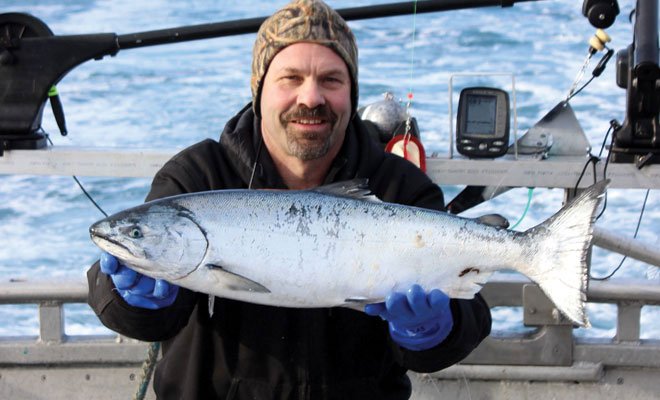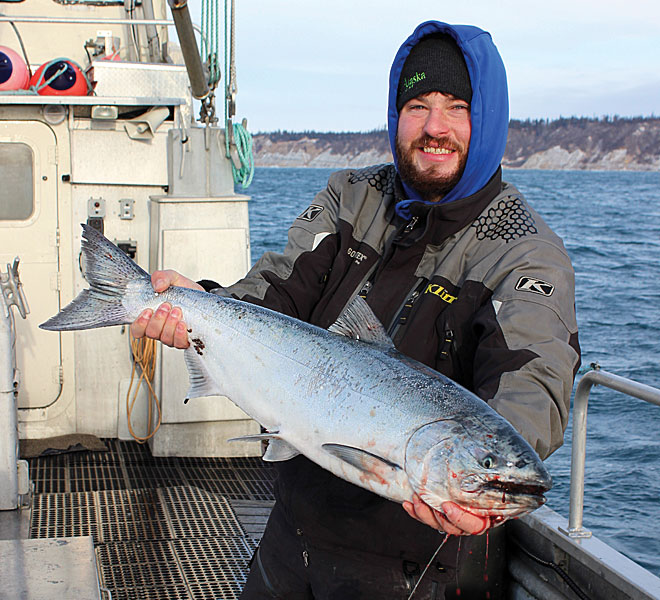
Captain Steve Tutt took a break to pose with this nice feeder king.
by Melissa Norris
Right now, despite the non-summer chill in the air, you can drop everything you are doing, pack your Xtratufs, Grundéns and perhaps some lunch, and then head down the Sterling Highway for a little saltwater king salmon fishing. Or make it even easier and book a 45-minute flight from Anchorage on Ravn and end up in Homer first thing in the morning. The point is whether you’re driving or flying, you can head for Homer, spend a day on the water and be back in your warm and cozy bed that same night—with a limit of fresh-from-the-salt feeder kings packed away in the freezer.
We just made that trip, and all I have to say is that if we had the time, we would have planned to stay a couple additional days to maximize our fun.
This king fishery is vibrant and healthy, and the interesting part, according to ADF&G biologists, is that these fish are coming from California, Oregon, Washington and British Columbia to feed until they are ready to head back to their natal rivers to spawn. The genetic sampling ADF&G has been conducting is well underway and so far results show that over 99 percent of the king salmon sampled over 2014 and 2015 during the winter months are from outside Cook Inlet. Many of these fish are actually hatchery fish identifiable by their clipped adipose fins. Knowing there is a healthy run of feeder kings foraging food in Kachemak Bay and Cook Inlet, my husband and I readily accepted an invitation to fish out of Homer with Homer King Fishing, which is owned by father and son Steve and Eric Tutt.
Steve Tutt is a longtime, multi-generational commercial fisherman out of Homer and his sons are as well. The Tutts are also big-time sport fishermen and outdoor enthusiasts who fish, hunt and ride snowmachines as often as they can get out—and since they live in Homer year-round, they can get out a lot. Steve and his son Eric have found a way to do more of what they love by offering the cool advantage of sport-fishing for winter kings in Homer off their huge 55-foot seiner the F/V Redemption that Steve captains during commercial fishing season to harvest pinks and chum salmon in Prince William Sound.
Known as winter kings, these salmon are feeder kings that on average range between 10- to 20 pounds. They get larger as the spring progresses, which Steve’s son Joel, who fished with us that day, explained as we worked our gear. That is good reason for the Homer Winter King tournament to have been held on March 18th this year, as the kings have had a chance to feed all winter and grow. This one-day tournament drew a record of over 1,500 fishermen in 2016, and participation has been growing steadily over the past several years. The derby is put on by the Homer Chamber of Commerce & Visitor Center and they award tens of thousands of dollars in prizes for the largest kings caught. The 2016 derby winner was local Homer resident Eric Holland, who caught a 26.45-pound feeder king and netted over $31,000 from it, the biggest derby payout statewide. For more information about the Homer Winter King Tournament check out homeralaska.org.
Besides the derby there are many more days of the year to choose from, depending on weather. If you can be flexible with your dates you’ll be even better off because they can get a bead on the weather and tides about a week out and from there play it by ear pretty successfully. Steve has been sending pictures of great days on the water since December, enticing us to nail-down dates for our trip.
As mentioned, a feature of Homer fishing is that you can be back in your bed that same night, though you might also choose to overnight at the Best Western, Beluga Lake Lodge or the Driftwood Inn and fish for a couple of days. The 2-per-day feeder king bag and possession limits caught between September 1 and March 31 do not count towards your total king salmon season limits of five kings; plus, these fish are just plain delicious and known for having an extra-high fat content. April and May are still great times to fish for these feeder kings, but after April 1 the kings do apply to your annual limit of five kings. Still, you’re likely to see success in catching these quality fish and many charters offer special rates this time of year. And while most of the winter king anglers are Alaska residents, if you are visiting Alaska this time of year for the Sportsman Show or any other reason, it is a great opportunity to go fishing.

Steve’s son Joel was able to join us.
The Tutts’ primary method for catching kings is to troll using downriggers, flashers and bait that is brined in a blue herring formula. Steve diligently logs his fishing information, which helps keep him clued into what’s working at any particular time, so he is just as prepared to run one of the rods with a trolling lure such as the Coho Killers by Silverhorde that have proven highly effective out here. These guys are out on the water a lot and have been for a long time so they are aware of the day-to-day nuances of the fishery that help make them good anglers. We kept 7 of 8 possible kings that day and landed a few more that we let go. There was one white king in the bunch that we took home. The meat looks great now, vacuum-sealed and in one-third-pound packages in the freezer. Of course I kept a fresh piece out for consumption the next day. Joel had filleted our fish onboard, and we found it easy to bring a cooler back on Ravn, and stayed up late processing our own fish.
For the do-it-yourself angler looking for winter king options, mooring your own boat out of Homer is the way to go, and kayak fishing in the saltwater year-round is growing in popularity for an affordable and adventurous option that would be pleasantly thrilling as long as you had the right gear.
Fishing in the winter sounds cold, but again with the right gear and a couple trips into a warm cabin, the 25-degree weather we experienced was pretty comfortable. And it is exhilarating to fish for hard-fighting kings, especially in cooler temperatures. And it was extra-rewarding for me because I usually get very seasick and on this trip I did not. I don’t know whether it was Steve’s huge fishing vessel or the flattish water we had that day fishing near the bluffs, but for a soured salty who loves to ocean fish but cannot often stomach the day, it was surprisingly sweet.


